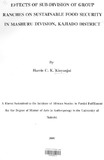| dc.contributor.author | Kinyanjui, Harrie C. K | |
| dc.date.accessioned | 2013-05-09T12:34:28Z | |
| dc.date.available | 2013-05-09T12:34:28Z | |
| dc.date.issued | 2001 | |
| dc.identifier.citation | Master of Arts in Anthropology | en |
| dc.identifier.uri | http://erepository.uonbi.ac.ke:8080/xmlui/handle/123456789/20877 | |
| dc.description.abstract | The research was carried out to investigate the effects of subdivision of group ranches on sustainable food security in Mashuru Division of Kajiado District. Investigations determined how the subdivision of the group ranches has affected livestock production. The management of the new individual ranches with no skill in the new farming system will affect productivity and hence affect food availability. Group approach to the utilization of communal infrastructures is not there any more and most of them will not be serviceable in the near future. The study was guided by the cultural ecology theory. Cultural ecology will assist in the understanding of the adjustment or relationship of culture to the natural environment. This includes looking at the features of the environment itself and the cultural arrangements by which the environment is exploited. The environment will not change and therefore the new developments will have to be adjusted.
In the 1960s, the government introduced the group ranch concept to replace pastoralism with the intention of commercializing the pastoralists to increase income and provide essential services. 13 group ranches were formed which now comprise Mashuru Division. Problems started almost as soon as these group ranches were formed. In the 1970s and 1980s, the members opted for individual land tenure. The government allowed the subdivision after fulfillment of some conditions. By the time the research was being conducted, all the ranches had been subdivided, some officially while others were preoccupied in the process of formalizing the subdivision except Kiboko which is still a group ranch. The qualitative research method was used and the techniques selected to
carry out this research included direct observation, interviewing key informants and focus group discussions.
Results of the study showed that the subdivision will affect food security. This is indicated by the size of land parcels and the change in the size and type of herds. After subdivision, some parcels have already been subdivided further for purpose of selling. Change in land use which included cultivation was coming in when cultivation of crops was still foreign to the Maasai and the environmental degradation was not being addressed considering the fragile nature of the semi-arid regions. These problems compounded by the harsh climatic and political environment has made the subdivision of the former group ranches affect sustainable food security. It is only the intervention from the government and other donors through provision of the necessary resources that can make the change in land use overcome the food security problem. Food security would be achieved not only through food production but also having the power to purchase food. | en |
| dc.language.iso | en | en |
| dc.publisher | University of Nairobi. | en |
| dc.title | Effects of sub-division of group ranches on sustainable food security in Mashuru division, Kajiado district | en |
| dc.type | Thesis | en |
| local.publisher | Institute of African Studies | en |

